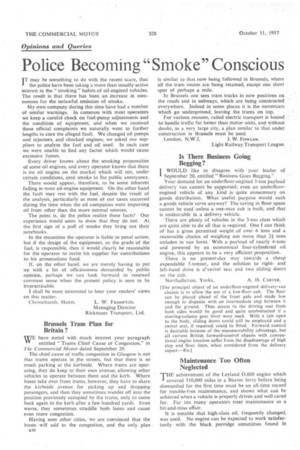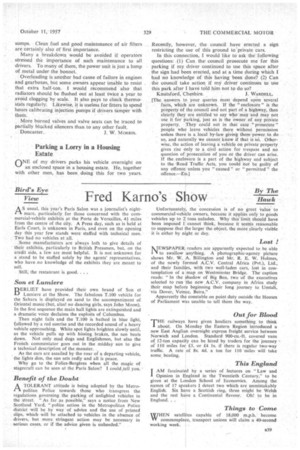Police Becoming "Smoke" Conscious
Page 70

Page 73

If you've noticed an error in this article please click here to report it so we can fix it.
IT may be something to do with the recent scare, that I the police have been taking a more than usually active interest in the" smoking" habits of oil-engined vehicles. The result is that there has been an increase in summonses for the unlawful emission of smoke.
My own company during this time have had a number of similar warnings. In common with most operators we keep a careful check on fuel-pump adjustments and the condition of equipment, and when we received these official complaints we naturally went to further lengths to cure the alleged fault. We changed oil pumps and injectors, and checked engines; we asked our suppliers to analyse the fuel and oil used. In each case we were unable to find any factor which would cause excessive fumes.
Every driver knows about the smoking propensities of some oil engines, and every operator knows that there is no oil engine on the market which will not, under certain conditions, emit smoke to the public annoyance.
There would appear, therefore, to be some inherent failing in most oil-engine equipment. On the other hand the fault may rest with the fuel, despite the result of the analysis, particularly as most of our cases occurred during the time when the oil companies were importing oil from other than the more -normal sources.
The point is, do the police realize these facts? Our experience would seem to show that they do not. At the first sign of a puff of -smoke they bring out their notebooks.
In the meantime the operator is liable to penal action, but if the design of the eqUipment, or the grade of the fuel, is responsible, then it would clearly be reasonable for the operator to invite his supplier for contributions to his prosecutions fund.
If, on the other hand, we are merely having to put up with a lot of officiousness demanded by public opinion, perhaps we can look forward to renewed common sense when the present policy is seen to be impracticable.
I shall be most interested to hear your readers' views on this matter.
Christchurch, Hants. L. W. FRAMPTON.
Managing Director Rickmans Transport, Ltd.
Brussels Tram Plan for Britain ?
wE have noted with much interest your paragraph entitled "Trams Chief Cause of Congestion," in The Commercial Motor dated September 20.
The chief cause of traffic congestion in Glasgow is not that trams operate in the streets, but that there is so much parking at the kerbside. Where trams are operating, they do keep to their own avenue, allowing other vehicles to operate between them and the kerb. Where buses take over from trams, however, they have to share the kerbside avenue for picking up and dropping passengers, and then they sometimes wander off into the position previously occupied by the trams, only to come back again to the kerb after a few hundred yards. Even worse, they sometimes straddle both lanes and cause even more congestion.
Having seen other cities, we are convinced that the buses will add to the congestion, and the only plan B36 is similar to that now being followed in Brussels, where all the tram routes are being retained, except One short spur of perhaps a mile.
In Brussels one sees tram tracks in new positions on the roads and in subways, which are being constructed everywhere. Indeed in some places it is the motorcars Which go underground, leaving the trams on top.
For various reasons, railed electric transport is bound to handle traffic far better than motor units, and without doubt, in a very large city, a plan similar to that under construction in Brussels must be used.
London, N.W.2. J. W. FOWLER.
Light Railway Transport League.
Is There Business Going Begging?
I WOULD like to disagree with your leader of
September 20, entitled " Business Goes Begging."
Your demand for an underfloor-engined 5-ton payload delivery van cannot be supported; even an underfloorengined vehicle of any kind is quite unnecessary on goods distribution. What useful, purpose would such a goods vehicle serve anyway? The saving in floor space cannot be used unless a one-man cab is built, and that is undesirable in a delivery vehicle.
There are plenty of vehicles in the 3-ton class which are quite able to do all that is required. One I can think of has a gross permitted weight of over 6 tons and a reasonable chance of weighing not more than 24. tons unladen in van form. With a payload of nearly 4-tons and powered by an economical four-cylindered oil engine, this appears to be a very efficient proposition.
There is no present-day way towards a cheap expendable 5-tonner, and the solution to rightand left-hand drive is e swivel seat and two sliding doors on the cab.
Northallerton, Yorks. A. H. CARTER.
[The principal object of an underfloor-engined delivery-van chassis is to allow the use of a low-floor cab. The floor can be placed ahead of the front axle and made low enough to dispense with an intermediate step between it and the ground. Thus access to the driving seat from both sides would he good and quite unobstructed if a steering-column gear lever were used. With a cab open to the body, sliding doors could still be employed and a swivel seat, if required, could be fitted. Forward control is desirable because of the manteuvrability advantage, but all current British forward-control chassis with conventional engine location suffer from the disadvantage of high step and floor lines, when considered from the delivery aspect—En.]
Maintenance Too Often Neglected
THE achievement of the Leyland 0.600 engine which covered 510,000 miles in a Beaver lorry before being dismantled for the first time must be an all-time record for trouble-free maintenance, and shows what can be achieved when a vehicle is properly driven and well cared for. Far too many operators treat maintenance as a hit-and-miss affair.
It is notable that high-class oil, frequently changed, was used. No engine can be expected to work satisfactorily with the black porridge sometimes found in sumps. Clean fuel and good maintenance of air filters are certainly also of first importance. Many a breakdown would be avoided if operators stressed the importance of such maintenance to all drivers. To many of them, the power unit is just a lump of metal under the bonnet.
Overloading is another bad cause of failure in engines and gearboxes, but some owners appear Unable to resist that extra half-ton. I would recommend also that radiators should be flushed out at least twice a year to avoid clogging by scale. It also pays to check thermoStats regularly. Likewise, it is useless for fitters to spend hours calibrating injection pumps if drivers tamper with them.
More burned valves and valve seats can be traced to partially blocked silencers than to any other fault.
Doncaster. J. W. MORRIS.
Parking a Lorry in a Housing Estate
0NE of my drivers parks his vehicle overnight on an enclosed space in a housing estate. He, together with other men, has been doing this for two years.
Recently, however, the council have erected a sign restricting the use of this ground to• private cars.
In this connection, I would like to ask the following questions: (1) Can the council prosecute me for this parking if my driver continued to use this space after the sign had been erected, and at a time during which I had no knowledge of this having been done? (2) Can the council take action if my driver continues to use this park after I have told him not to do so?
Knutsford, Cheshire. J. WARDELL.
[The answers to your queries must depend upon several facts, which are unknown. If the " enclosure " is the property of the council and not part of a highway, then clearly they are entitled to say who may and may not use it for parking, just as is the owner of any private property. They could not in that case "prosecute" people who leave vehicles there without permission unless there is a local by-law giving them •power to do so, and naturally we cannot know if that is so. Otherwise, the action of leaving a vehicle on private property gives rise only to a civil action for trespass and no question of prosecution of you or the driver can arise. If the enclosure is a part of the highway and subject to the Road Traffic Acts, you could not be guilty of any offence unless you "caused" or " permitted " the offence.---ED.]




















































































































